Books
Books, edited volumes
Please find below a selection of monographs, edited volumes and literary translations by members of our Department. We have been involved in several national and international research projects, the last one being the OTKA-funded Hungarian History of English Literature, on which you can find more information here.
Our junior and senior lecturers have been winners of the Excellence in Publication Award of the Faculty of Humanities, Eötvös Loránd University (ELTE) and the prestigious Book Prizes of the Hungarian Society for the Study of English (HUSSE) and its international counterpart, the European Society for the Study of English (ESSE).
Our lecturers have published with leading national and international publishing houses, including Akadémiai Kiadó (HU), Central European Press (HU), L‘Harmattan (HU), Bucknell University Press (US), Routledge (GB) and Palgrave Macmillan (GB). We also publish consistently in high-ranking European and Hungarian academic journals, besides running our own departmental journal, The AnaChronisT.
At the bottom of the page, please find a list of Festschrifts, published in honour of our professors, who have championed the field of English Studies in Hungary.
Monographs
 |
Zsolt Bojti, Queer Reading Practices and Sexology in Fin-de-Siècle Literature. Routledge, 2025. This book scrutinises the production and transnational distribution of sexological knowledge at the turn of the century. The works of three transnationally mobile authors are in the focus: The Picture of Dorian Gray (1890/91) and Teleny (1893) by, and attributed to, Oscar Wilde; ‘The True Story of a Vampire’ (1894) by Count Stanislaus Eric Stenbock, and Imre: A Memorandum (1906) by Edward Prime-Stevenson. The textual analysis is governed by references in all four works to Hungarian culture to demonstrate how they conceptualised ‘Hungarianness’ and same-sex desire simultaneously in light of the new classificatory science of sexualities coming from German-speaking Central Europe. By foregrounding a timely literary angle and a ‘culturalist’ approach, this book offers non-Anglocentric insights, not bound by either language or nationality, to shed new light on the interdisciplinary reading practices of late-Victorian subjects and the ways they contributed to the emergence of fin-de-siècle queer fiction. More information on the publisher's website here. |
 |
Natália Pikli, Shakespeare minden időkre. Európa, 2025. Why Shakespeare? Why has this guy been written about for hundreds of years? Why can't we get rid of him? Why can't we get tired of him? Why do we have to write another book about him?" asks the author, who, 33 years after the publication of the last book in Hungarian on the complete career of Shakespeare, provides answers to all these questions in his scholarly and highly entertaining monograph, which is very timely. And as a woman researcher, she is not only able to add to our knowledge of the past thirty years of research! More information on the publisher's website here. |
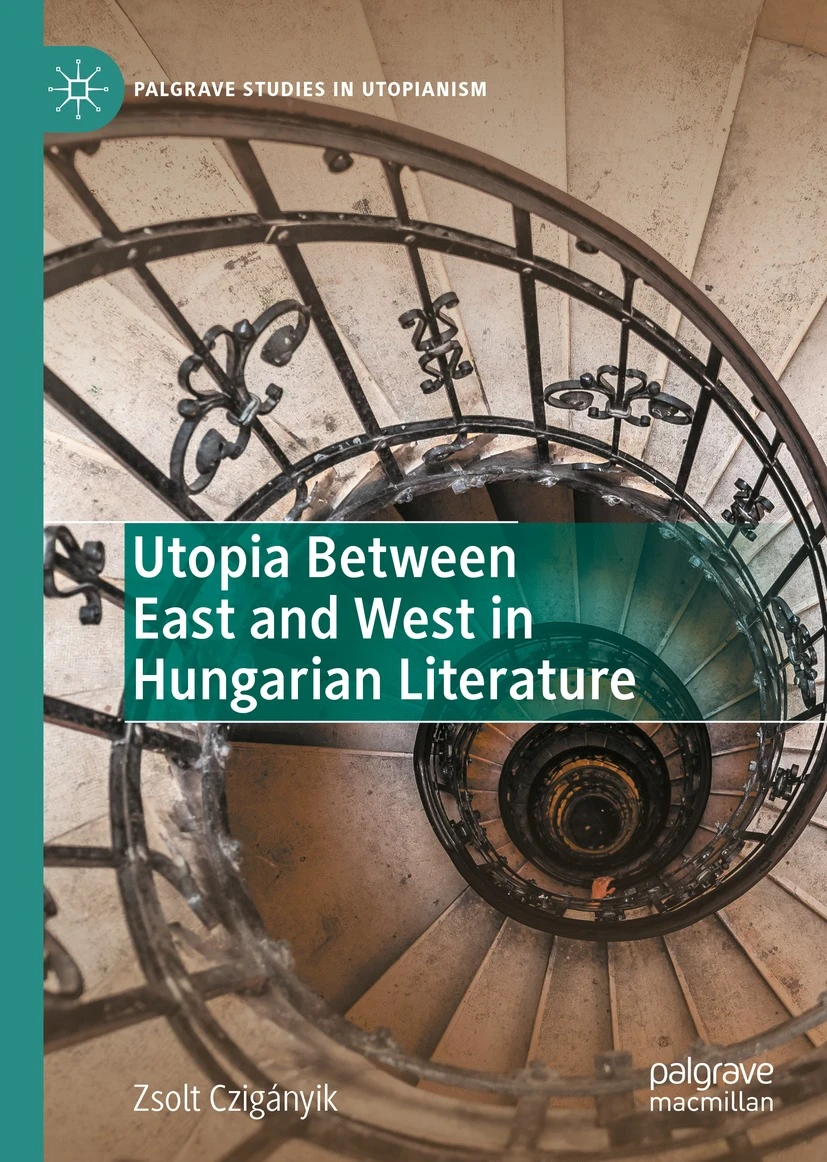 |
Zsolt Czigányik, Utopia Between East and West in Hungarian Literature. Palgrave Macmillan, 2022.
This book focuses on the most important utopian and dystopian literary texts in nineteenth and twentieth-century Hungarian literature, and therefore widens the scope of the traditionally Anglophone canon. Utopian Studies is becoming increasingly interdisciplinary, and this research integrates literary hermeneutics with ideas and methods from political science and the history of ideas. In doing so, it argues that Hungarian utopianism was influenced by the region’s (and Hungarian culture’s) position of permanent liminality between Western and Eastern European patterns of power structures, social and political order. After a thorough methodological introduction, some early modern texts written in Hungary are discussed, while the detailed analyses focus on nineteenth-century texts, written by Bessenyei, Madách, and Jókai, whereas the twentieth century is represented by Karinthy, Babits and Szathmári. In the interpretations the results of contemporary scholarship are applied, particularly the works of Lyman Tower Sargent, Gregory Claeys and Fátima Vieira. More information on the publisher’s website. |
 |
Natália Pikli, Shakespeare’s Hobby-Horse and Early Modern Popular Culture. Routledge, 2022.
This book explores the ways in which the early modern hobby-horse featured in different productions of popular culture between the 1580s and 1630s. Natália Pikli approaches this study with a thorough and interdisciplinary examination of hobby-horse references, with commentary on the polysemous uses of the word, offers an informative background to reconsider well-known texts by Shakespeare and others, and provides an overview on the workings of cultural memory regarding popular culture in early modern England. The book will appeal to those with interest in early modern drama and theatre, dramaturgy, popular culture, cultural memory, and iconography. More information on the publisher’s website. |
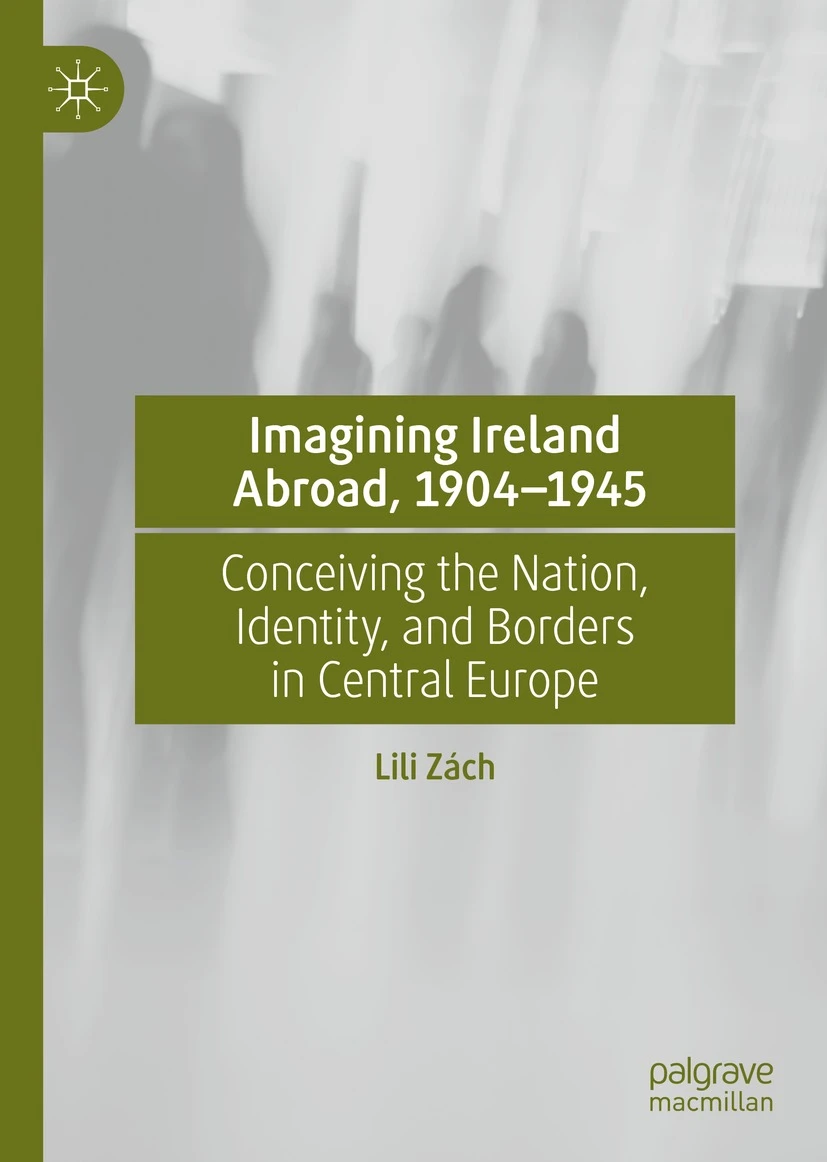 |
Lili Zách, Imagining Ireland Abroad, 1904–1945. Palgrave Macmillan, 2021.
Offering a unique account of identity formation in Ireland and Central Europe, this book explores and contextualises transfers and comparisons between Ireland and the successor states of the Austro-Hungarian Empire. It reveals how Irish perceptions of borders and identities changed after the (re)birth of the small states of Austria, Hungary and Czechoslovakia and the creation of the Irish Free State. Adopting a transnational approach, the book documents the outward-looking attitude of Irish nationalists and provides original insights into the significance of personal encounters that transcended the borders of nation-states. Drawing on a wide range of official records, private papers, contemporary press accounts and journal articles, Imagining Ireland Abroad, 1904-1945 bridges the gap between historiographies of the East and West by opening up a new perspective on Irish national identity. More information on the publisher’s website. |
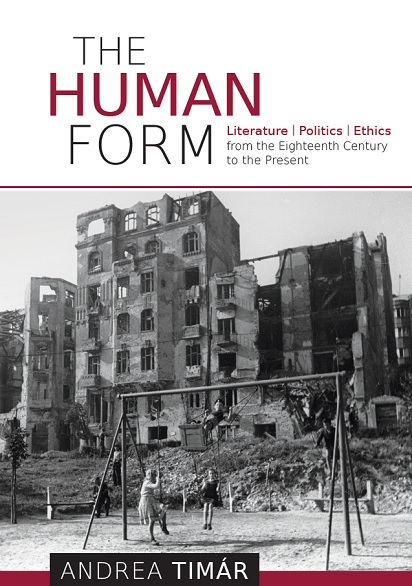 |
Andrea Timár, The Human Form: Literature, Politics, Ethics, from the Eighteenth Century to the Present. Eötvös Kiadó, 2020.
This book examines what it has meant to be human from the eighteenth century to the present. The first part of the volume critically engages with eighteenth-century notions of sympathy (as elaborated by Adam Smith) and our present notion of narrative empathy (Martha Nussbaum, Suzanne Keen). It examines how novels, such as Agota Kristof’s The Notebook (1986), Noémi Szécsi’s Gondolatolvasó [The Mind-reader] (2013), J. M. Coetzee’s Foe (1986) and Gergely Péterfy’s Kitömött barbár [Stuffed Barbarian] (2014), question the ethical and political stakes involved in the exercise of “sympathetic imagination” for our (lack of) understanding and/or recognition of the human. The second part of the volume offers critical readings of texts by Matthew Arnold, Immanuel Kant, William Wordsworth, John Keats, Paul de Man, Jacques Derrida, Jacques Rancière, and Quentin Meillassoux in order to investigate the poetics and the politics of human form. It establishes (further) dialogues between the long nineteenth century and our contemporary world through the notions of virtual trauma, autoimmunity, terror, the posthuman, the catastrophe and the crisis of temporality. The book is available on ELTE Reader. |
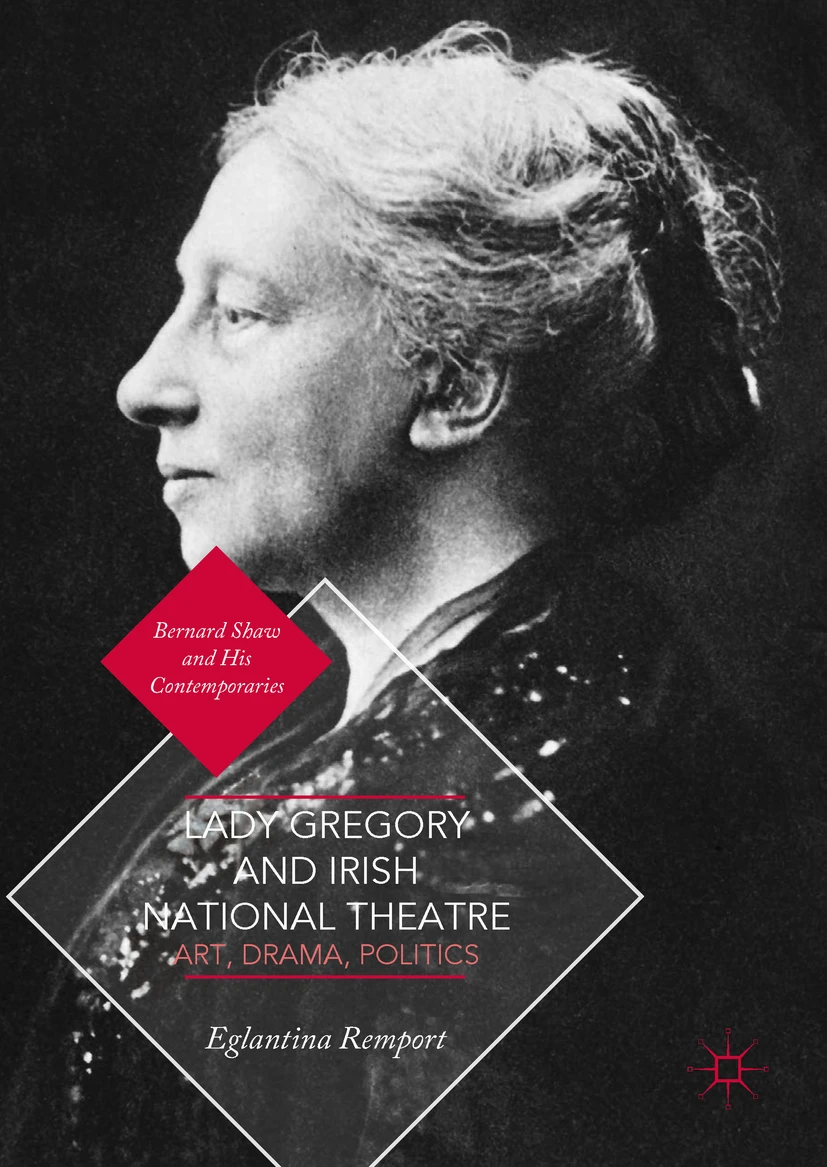 |
Eglantina Remport, Lady Gregory and Irish National Theatre: Art, Drama, Politics. Palgrave Macmillan, 2018.
This book is the first comprehensive critical assessment of the aesthetic and social ideals of Lady Augusta Gregory, founder, patron, director, and dramatist of the Abbey Theatre in Dublin. It elaborates on her distinctive vision of the social role of a National Theatre in Ireland, especially in relation to the various reform movements of her age: the Pre-Raphaelite Movement, the Co-operative Movement, and the Home Industries Movement. It illustrates the impact of John Ruskin on the aesthetic and social ideals of Lady Gregory and her circle that included Horace Plunkett, George Russell, John Millington Synge, William Butler Yeats, and George Bernard Shaw. All of these friends visited the celebrated Gregory residence of Coole Park in Country Galway, most famously Yeats. The study thus provides a pioneering evaluation of Ruskin’s immense influence on artistic, social, and political discourse in Ireland in the late nineteenth and early twentieth century. More information on the publisher’s website. |
 |
Katalin Szlukovényi, Kétkedők: Irónia, önirónia és humor a huszadik századi zsidó amerikai prózában. Ráció, 2017.
The research of self-irony, that is of irony reflecting on identity, has perhaps never been more relevant than recently in Central and Eastern Europe. Alongside the mutually exclusive alternatives of completely neglecting or combatively asserting identity, self-irony offers a third option: the opportunity for the continuous reinterpretation of one’s identity, which can prove to be a joyful task in spite of all its difficulties. Katalin Szlukovényi places self-irony in the conceptual space designated by various interpretations of humour and irony and explores these three phenomena in numerous canonical works of Jewish American fiction, including classics as well as stories by contemporary authors. The book is available here. |
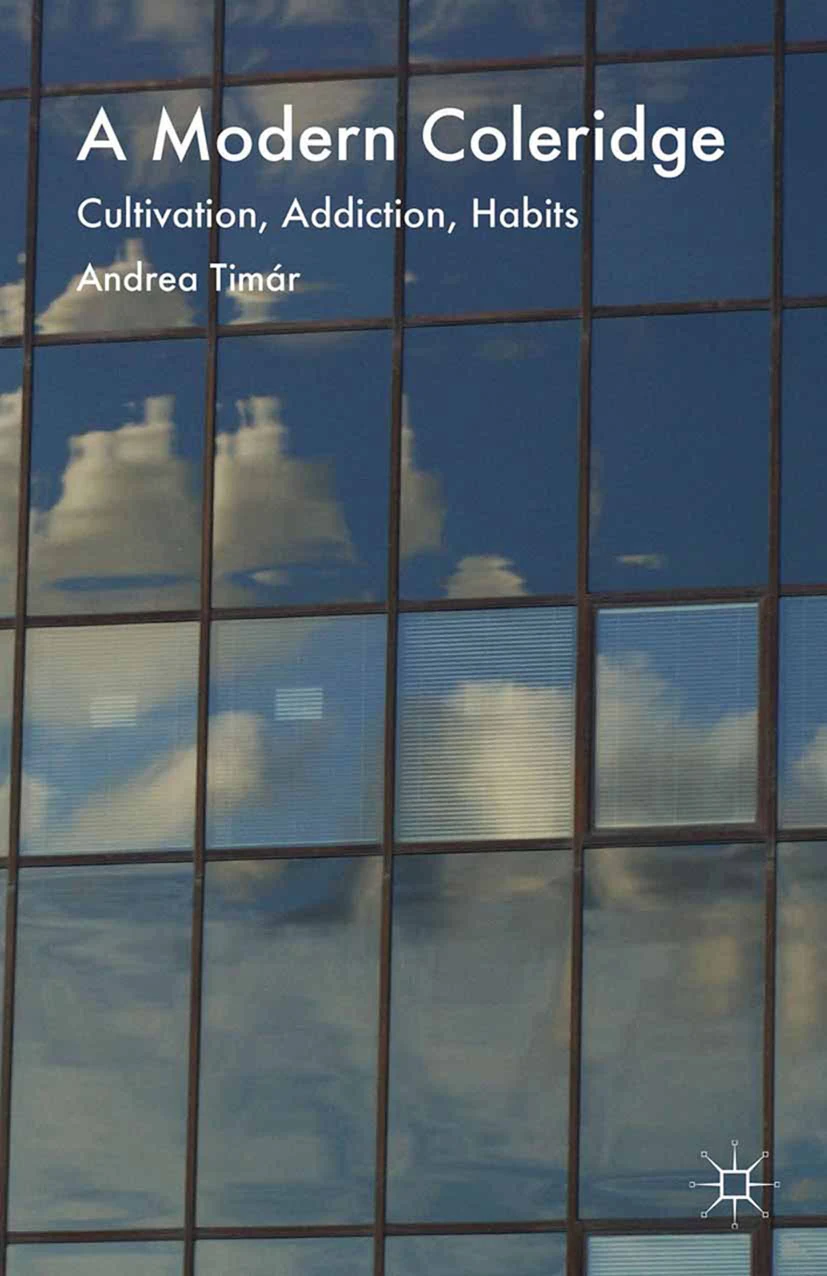 |
Andrea Timár, A Modern Coleridge: Cultivation, Addiction, Habits. Palgrave Macmillan, 2015.
A Modern Coleridge shows the interrelatedness of the discourses of cultivation, addiction and habit in Coleridge's poetry and prose, and argues that these all revolve around the problematic nexus of a post-Kantian idea of free will, essential to Coleridge's eminently modern idea of the 'human'. More information on the publisher’s website. |
|
Bálint Gárdos, Földönjáró romantikusok: A XIX. század elejének esszéirodalmáról. L'Harmattan Kiadó, 2012.
Although recent trends in modern literary theory not only do not favour, but outright deny the existence of genres in the traditional sense, literary historian Bálint Gárdos now presents (in his foreword, arguing for his idea) a classic volume on genre theory. At the heart of his work is the English essay literature of the first two decades of the nineteenth century. He presents his chosen theme in the light of the oeuvre of three typical authors of the period (less well known in Hungary). More information on the publisher’s website. |
|
|
Zsolt Komáromy, Figures of Memory: From the Muses to Eighteenth-Century British Aesthetics. Bucknell University Press, 2011.
Zsolt Komáromy's Figures of Memory effects a rapprochement between memory studies and eighteenth-century British aesthetics. It argues that the assessment of memory in the history of aesthetics and criticism has been determined by the ideological import of the creative imagination, based on the supposed dichotomy of reproductive and productive mental powers. The rich notion of memory, however, unsettles this dichotomy, and Komáromy argues that the literary relevance of memory is explained precisely by its resistance to the reproductive-productive opposition. He explores these issues through various "figures" representing senses of memory, such as the Muses, or through metaphors for memory in philosophical and critical discourse. Tracing figures of memory from the Muses through Plato and Descartes to works by Pope, Addison, Gerard, and Kames, Komáromy reveals an undercurrent of thought in eighteenth-century aesthetics that questions memory's nominal opposition to the imagination, and that exploits memory's simultaneously reproductive and constructive nature in the emerging theory of the imagination. By arguing that the tradition of memory's literary relevance is not marginalized but in fact perpetuated in eighteenth-century British critical thought, Figures of Memory provides a powerful new perspective on the history of memory in aesthetics and criticism. More information on the publisher’s website. |
|
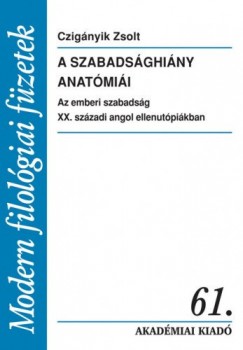 |
Zsolt Czigányik, A szabadsághiány anatómiái: Az emberi szabadság XX. századi angol ellenutópiákban. Akadémiai Kiadó, 2011.
This volume, analysing dystopia, one of the most popular genres of 20th century English literature, fills a gap in Hungarian book publishing. The study examines the most important works, giving central importance to George Orwell's Nineteen Eighty-Four, which is considered as a point of reference in the interpretation of the other examined books - be it Anthony Burgess's negative utopias or earlier works: Aldous Huxley's Brave New World or Rex Warner's Aerodrome. Beyond the tools of literary studies, the investigation interprets the works on a broader philosophical horizon. In doing so, it comes to the conclusion that human freedom, as a condition for a life worthy of humans, is of central importance in dystopias, and the genre can be considered an indirect anatomy of freedom: the works mostly present worlds where freedom suffers some important impairment, and as a result, life becomes distorted or meaningless. In this way, literary reflection helps a more complete understanding of one of the basic questions of European thought, the philosophical concept of freedom. |
 |
Iván Nyusztay, Az önazonosság konfigurációi az abszurd drámában: Samuel Beckett, Harold Pinter, Tom Stoppard. L’Harmattan, 2010.
The trailblazing contributions of Samuel Beckett, Harold Pinter and Tom Stoppard to the history of theatre and drama have had a huge impact on the global stage ever since the second half of the twentieth century. The immense complexity and richness of their works, including the multi-layered textuality pose a great challenge to theatregoers and readers alike. This book is designed to assist them. Ivan Nyusztay's monograph maps the history of the absurd and highlights the major transformations of the concept in literature and philosophy. Apart from discussing the titular authors' significance in the history of drama and genre theory, the book betrays the author's penchant for philosophical enquiry thanks to which we get a glimpse into the fruitful relationship between drama and philosophy. The phenomenon and configurations of self-identity constitute a perspective that helps to trace the differences and the overlappings between the works of these dramatists. At the same time, the monograph also attempts to draw the limits of the genre, paving the way from the absurd to the world of modern tragicomedy through detailed textual analyses. More information on the publisher’s website. |
 |
Miklós Lojkó, Meddling in Middle Europe: Britain and the 'Lands Between' 1919-1925. CEU, 2006.
This work addresses the much-ignored history of British policy towards Hungary, Czechoslovakia and Poland following the creation of nation states in Central Europe at the end of the First World War. Lojkó convincingly argues that the absence of trust in the new political settlement and the discrediting of the traditional channels of diplomacy resulted in British influence in the region, being exerted mainly in the form of commercial and financial undertakings. While not always successful, the emergence of this new policy affected the development of diplomatic ties with these new nations. Yet no lasting diplomatic leverage resulted from this British involvement, and the absence of such influence proved fatal in the late 1930's when the new system of nations was disintegrating under the pressure of escalating violence. More information here. |
|
Éva Péteri, Victorian Approaches to Religion as Reflected in the Art of the Pre-Raphaelites. Akadémiai Kiadó, 2003.
John Ruskin, the dogmatic, but at heart deeply doubtful art-critic, William Holman Hunt, the moralist artist-preacher, Dante Gabriel Rossetti, the intuitive poet-painter, John Everett Millais, the conscientious realist then popular sentimentalist, and their numerous followers represent different aspects of Pre-Raphaelitism. Yet, they were all typical Victorians, whose religious ideas and biblical works give a fascinating insight into the momentous religious concerns of the age: the fervent sectarian debates of the middle of the nineteenth century, the spread of agnosticism, the new Bible-interpretations called forth by scientific discoveries, and the move towards reconciliation and secularisation at the end of the century. The book is available with institutional access here. |
|
 |
Dóra Janzer Csikós, “Four mighty ones are in every man”: The Development of the Fourfold in Blake. Akadémiai Kiadó, 2003.
This book focuses on one of the most debated prophecies of Blake, The Four Zoas. The approach is basically psychological and before the main thesis is elaborated a brief survey is given about the most frequently studied parallels, such as Freud and Jung. The dissertation then proceeds to examine a new aspect: a parallel is drawn between the hypotheses of Lipót Szondi, disciple to Freud, and Blake's visionary universe. Szondi's System of Drives helps illuminate several questionable passages of Blake's dream vision, furthermore, as the parallel points out, an interesting change is discernible in Blake's concepts about Enlightenment and Rationalism, whereby the previously rejected ideas become integrated into a fourfold world of wholeness and intellectual sanity. The book is available with institutional access here. |
 |
János Kenyeres, Revolving around the Bible: A Study of Northrop Frye. Anonymus, 2003.
This book, concentrating on the works of one of the most outstanding literary critics of the 20th-century, serves three main purposes, as reflected in the three parts of the study. The first is to examine Northrop Frye's mental relationship with William Blake, and explore the ways in which Frye's reading of Blake's poetry influenced Frye’s concept of creative imagination, a central tenet of his criticism. In the course of this process, the book assesses Frye's religious background and his sudden experiences of insight, and examines the problem of perceiving reality as being inside and outside of language. The second part explores how the Bible formed Frye's critical views as represented in The Great Code, Words with Power and The Double Vision, and the process in which he shifted from an esoteric theory to a morally and socially open one. The third part investigates patterns of ideas that connect Frye's theoretical writings to various critical traditions and schools, from Aristotle through T.S. Eliot to deconstruction, reader-response criticism and cultural studies. Kenyeres also examines Frye's language, which in itself gives rise to his diverging critical reception. The study outlines the typical variations in Frye's recognition by the critical world from the 1950s and 60s to our day. The author reveals that Frye has contributed theoretical input to a number of critical approaches, and thereby, at least partially, achieved the otherwise idealistic goal of his critical writings in promoting some sense of unity among critical schools. While the first two parts of the book demonstrate that Frye's reading of Blake and the Bible sets out a pattern of interrelations, stretching well into the realm of both intertextuality and extratextuality, the third part concludes that Frye's concepts are of a generally applicable character, provoking response from a number of critical approaches. |
Edited volumes, anthologies
 |
William Shakespeare szonettjei. Trans. Sándor Fazekas. MMA Kiadó, 2023.
William Shakespeare (1564-1616) is one of the most most popular playwrights in world literature and he has also become one of the most quoted writers of sonnets. In Hungary Shakespeare’s sonnets are mostly known in their mid-20th-century translation by Lőrinc Szabó, which has been held in high regard ever since and is still considered canonical even though Szabó did not aim at complete faithfulness to the content of the original Shakespearean text. This book is the result of Sándor Fazekas’s bold and significant enterprise to give a brand new translation of all the 154 sonnets by Shakespeare with two significant merits: first, being true to the original early modern meaning of Shakespeare’s sonnets while offering an aesthetically pleasing translation, second, giving a detailed glossary and notes to suport the reading of the sonnets. This critical glossary contextualizes and interprets the sonnets and provides cultural historical background to the origins, meanings and intertextual references of the 400-year-old poems. The glossary and notes benefit much from the advice of Natália Pikli, the reader and Shakespeare expert of the volume, who also helped the translator understand Shakespeare’s early modern use of English. Sándor Fazekas expertly handles the metre and formulaic constraints of sonnets, and the book helps the readers orientate themeselves in the literary world of Shakespeare’s time and his lyrical universe while maintaining a highly readable and captivating style. The book has the potential to become the essential and often quoted volume for scholars, teachers and the general audience, while also giving a boost to new readings and interprerations of Shakespeare’ works. Academic consultant: Natália Pikli More information on the publisher’s website. |
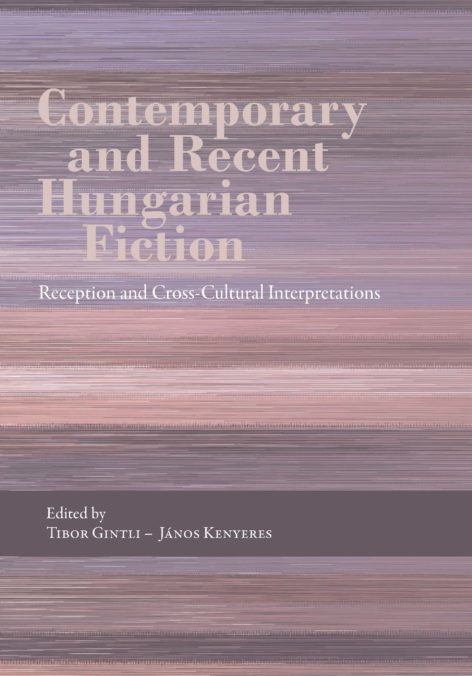 |
Tibor Gintli, János Kenyeres (eds.), Contemporary and Recent Hungarian Fiction: Reception and Cross-Cultural Interpretations. ELTE, 2022.
This volume seeks to provide international readers with a useful guide to recent and contemporary Hungarian fiction. Although it discusses individual writers and their output, as a whole, the book outlines the intrinsic network of interrelations traceable in Hungarian prose and offers a survey of the last seventy years through a careful selection of authors and works presented in chronological order, highlighting the main junctions crucial for the understanding of texts. We hope to address a wider educated public open to encounters with the masterpieces of internationally acknowledged writers—like Imre Kertész, Péter Esterházy, László Krasznahorkai, Péter Nádas,Géza, and Szilárd Borbély. A diversity of readings are conveyed through the lenses of contemporary literary historians and translators reflecting on the most prominent artistic oeuvres of the past decades available in English. The book is available on ELTE Reader. |
 |
Edward Prime-Stevenson. Imre: Egy emlékirat. Trans. Zsolt Bojti. Napvilág Kiadó, 2021.
The reader is invited to Budapest of the 1900s by this novel, written in 1906, which was available to a limited readership for a long time and only in English or a bit later in German. The narrator is an Englishman, Oswald (a possible autobiographical parallel with the author), who befriends a young military officer, Imre. There is a peculiar harmony that binds them together from the very beginning. Both of them are solitary men and have a secret weighing them down: they both are attracted to men. They dare not come out to each other in fear of rejection—but they realise in the end: this is, indeed, love; there is nothing to hide. But is it not womanish to fall in love with a man? Is this sort of thing pathological? And as love would have it, Oswald and Imre have their fair share of disappointment, joy, bitterness, as the novel draws to its end. Meanwhile, Prime-Stevenson introduces Hungary at the turn of the century (apparently, he was here and knew Hungarian!) and popular psychological thought of the era. Introduction and notes on the text by Zsolt Bojti. More information on the publisher’s website. |
 |
Ulrich Schlie, Miklós Lojkó, Thomas Weber (eds.), Vom Nachkrieg zum Vorkrieg: Die Pariser Friedensverträge und die internationale Ordnung der Zwischenkriegszeit. Nomos Verlagsgesellschaft, 2020.
Today, Europe is a political and economic entity, but the historical thinking of the European peoples is essentially characterised by the history of their own nation. The question of the political order of the interwar period is a perennial favourite of international historians. The significance of this prelude to the Second World War arises from the rise of dictatorships and the question of whether crisis was the lasting signature of the era. This anthology looks at the unfinished attempts at order and the interplay between domestic and foreign policy in the 1920s and 1930s from today's perspective. It brings together different national perspectives and poses questions about the consequences. More information here. |
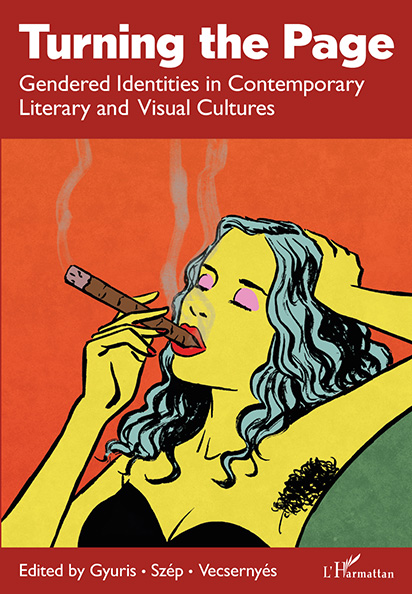 |
Kata Gyuris, Eszter Szép, Dóra Vecsernyés (eds.), Turning the Page: Gendered Identities in Contemporary Literary and Visual Cultures. L'Harmattan, 2018.
The essays in this volume are all selected papers from the conference Gendered Identities in Contemporary Literary and Visual Cultures, organized in June 2015 in Budapest, Hungary, by the Narratives of Culture and Identity Research Group. The authors deal with a wide array of gender issues in modern and postmodern English literature, contemporary popular culture, and postcolonial and Eastern European studies. The essays are arranged into three larger chapters based on their subject matter: “Dissecting Identities” examines gendered identities in various literary contexts; “Creating Social Identities” looks at the function of society and culture in identity formation; and “Reinventing Gender Roles” deals with subversive uses of gender representation. The collection displays several applications of gender studies as well as the authors’ enthusiastic engagement with the many directions in which gender studies can take us. The book is available on ELTE Reader. |
 |
Zsolt Czigányik (ed.), Utopian Horizons: Ideology, Politics, Literature. CEU, 2017.
The 500th anniversary of Thomas More’s Utopia has directed attention toward the importance of utopianism. This book investigates the possibilities of cooperation between the humanities and the social sciences in the analysis of 20th century and contemporary utopian phenomena. The papers deal with major problems of interpreting utopias, the relationship of utopia and ideology, and the highly problematic issue as to whether utopia necessarily leads to dystopia. Besides reflecting the interdisciplinary nature of contemporary utopian investigations, the eleven essays effectively represent the constructive attitudes of utopian thought, a feature that not only defines late 20th- and 21st-century utopianism, but is one of the primary reasons behind the rising importance of the topic. The volume’s originality and value lies not only in the innovative theoretical approaches proposed, but also in the practical application of the concept of utopia to a variety of phenomena which have been neglected in the utopian studies paradigm, especially to the rarely discussed Central European texts and ideologies. More information on the publisher’s website. |
 |
András Kiséry, Zsolt Komáromy, Zsuzsanna Varga (eds.), Worlds of Hungarian Writing: National Literature as Intercultural Exchange. Fairleigh Dickinson University Press, 2016.
Worlds of Hungarian Writing responds to the rapidly growing interest in Hungarian authors throughout the English-speaking world. Addressing an international audience, the essays in the collection highlight the intercultural contexts that have molded the conventions, genres and institutions of Hungarian writing from the nineteenth century to the present. Worlds of Hungarian Writing posits intercultural exchange as the very substance of a literary culture. Discussions of the politics of appropriation and translation, of the impact of émigré writers and critics, and of the use of world-literary models in genre-formation complement studies of the fate of western leftist critical theory in post-1989 Hungary, of the role of African-American models in contemporary Roma culture, and of the use of photography in late 20th-century prose. |
 |
Dorottya Jászay, Andrea Velich (eds.), Film and Culture. ELTE, 2016.
The edited volume examines cinematic representations of British, Irish, Australian and Canadian culture, with special focus on literary cultural products. The fourteen chapters analyze, among others, film adaptations of William Shakespeare’s Romeo and Juliet and Macbeth, Henry James’s The Turn of the Screw, James Joyce’s The Dead, Anthony Burgess’s The Clockwork Orange and George Orwell’s Nineteen Eighty-Four. Some of the chapters discuss English monarchy films, British documentary films, Irish romantic comedies, and films on the Aboriginal population of Australia. The popular James Bond movies and the Sherlock Holmes series are also analyzed in one of the opening chapters. The essays aim to serve two functions: 1) they are compulsory readings for students of the Department’s Film and Culture Specialization; 2) they are optional materials for students of the English Literature BA Programme. The book is available here. |
|
László Péter, Hungary's Long Nineteenth Century: Constitutional and Democratic Traditions in a European Perspective. Ed. Miklós Lojkó. Brill, 2012.
László Péter, whose fourteen carefully selected essays are edited in this posthumous collection, was an indefatigable seeker of the most appropriate terminological modelling and narrative reconstruction of Hungary’s late nineteenth and early twentieth century progress from an essentially feudal entity into a modern European state. The articles examine thorny subjects, such as the growing tensions between the nationalities living within the multi-ethnic kingdom; language rights; autocracy, democracy and civil rights in Hungary perceived in a wider European context; the concept of the ‘Holy Crown’; the army question; church-state relations; the role of the intellectuals; and the changing British perception of Hungary. The central focus of the author’s microscope is reserved for a substantive re-evaluation of the Settlement between Hungary and the Austrian Empire in 1867, which had a decisive impact on the eventual fate of the old kingdom of Hungary and of the rest of Central Europe. More information on the publisher's website. |
|
 |
Bálint Gárdos, Ágnes Péter, Natália Pikli, Máté Vince (eds.), Confrontations and Interactions: Essays on Cultural Memory. L'Harmattan, 2011.
“…only in time can the moment in the rose-garden, / The moment in the arbour where the rain beat, / The moment in the draughty church at smokefall / Be remembered; involved with past and future. / Only through time time is conquered,” T.S. Eliot says in The Four Quartets. Synthesising the findings of a three-year research programme, overseen by the Department of English Studies at Eötvös Loránd University (ELTE), Budapest, but reaching out to many universities and other academic institutions both in Hungary and abroad, this volume offers a multi-faceted approach to the processes of cultural memory, very much including processes of omission, marginalisation, and suppression. Methodologically diverse and philologically detailed, these papers propose new avenues into the study of our shared European cultural, literary, and artistic history. With the twentieth century over and ever so ominously not yet over, the critical analysis of these traditions remains imperative in the humanities. Because, as Eliot also says, “A people without history / Is not redeemed from time.” The book is available here. |
|
Bálint Gárdos, Ágnes Péter, Veronika Ruttkay, Andrea Timár, Máté Vince (eds.), Idegen költők—örök barátaink: Világirodalom a magyar kulturális emlékezetben L'Harmattan, 2010.
"It’s a poor sort of memory that only works backwards", noted the Queen in Lewis Carroll's Through the Looking-Glass. Since September 2008, a research group at the Department of English Studies at ELTE, working on the topic "British Literature in Hungarian Cultural Memory", has been investigating the question of how memory, cultural memory, works both backwards and forwards. The present volume is the first in a planned series of papers presented at the research workshop's conference in June 2009. The papers examine the impact of the past on posterity in the context of various world literary phenomena, and the activity of posterity in interpreting, appropriating or even forgetting the past through gestures of reconstruction. More information on the publisher's website. |
|
 |
Miklós Lojkó (ed.), British Policy on Hungary 1918-1919: A Documentary Sourcebook. University of London, 1995.
The book is available here. |
Festschrifts
|
János Kenyeres, Miklós Lojkó, Tamás Magyarics, Éva Eszter Szabó, Nóra Deák (eds.), At the Crossroads of Human Fate and History. 2nd ed. ELTE, 2019.
Studies in honour of Tibor Frank on his 70th birthday. The book is available on ELTE EDIT. |
|
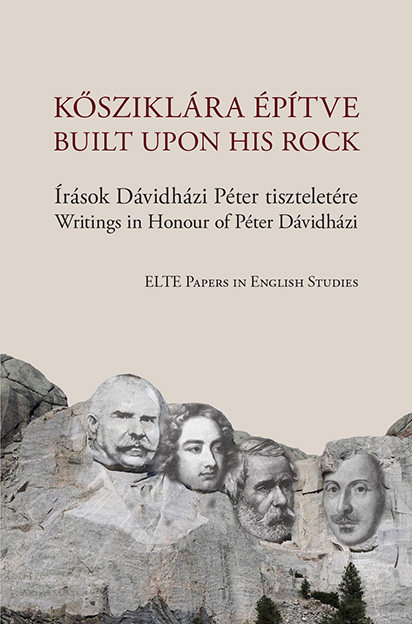 |
Dániel Panka, Natália Pikli, Veronika Ruttkay (eds.), Built upon His Rock. ELTE Papers in English Studies, 2018.
Writings in honour of Péter Dávidházi. The book is available on ELTE EDIT. |
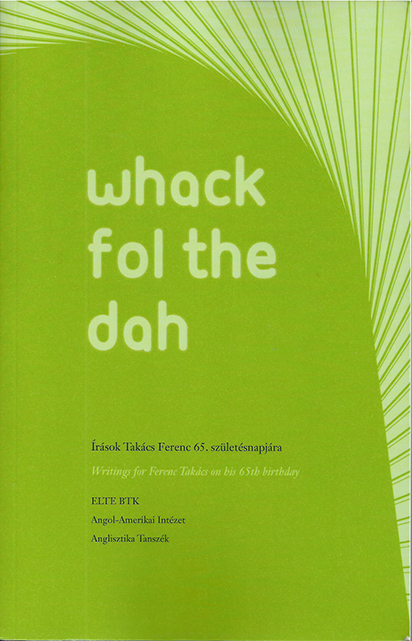 |
Ákos Farkas, Zsuzsanna Simonkay, Janina Vesztergom (eds.), Whack fol the dah. ELTE Papers in English Studies, 2013.
Writings for Ferenc Takács on his 65th birthday. The book is available on ELTE Reader. |
 |
Katalin Szlukovényi, Kata Gyuris, Katalin Kállay G., Mária Sántháné Gedeon (eds.). „Úgyse hiába.” ELTE Eötvös Collegium, 2013.
Recollections and essays in honour of István Géher. The book is available here. |
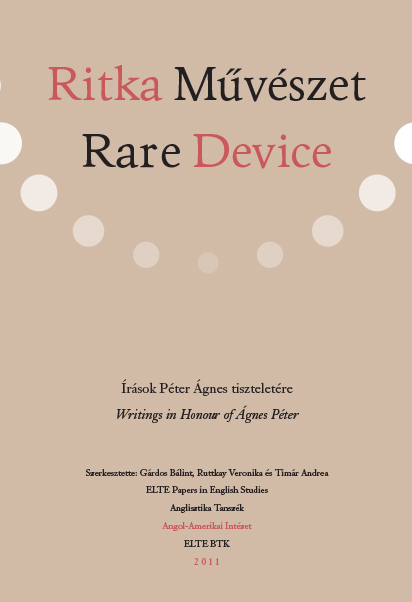 |
Bálint Gárdos, Veronika Ruttkay, Andrea Timár (eds.), Rare Device. ELTE Papers in English Studies, 2011.
Writings in honour of Ágnes Péter. The book is available on ELTE Reader. |
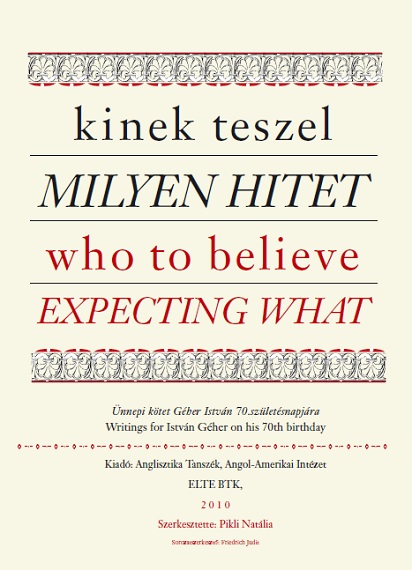 |
Natália Pikli (ed.), Who to believe expecting what. ELTE Papers in English Studies, 2010.
Writings for István Géher on his 70th birthday. The book is available on ELTE Reader. |
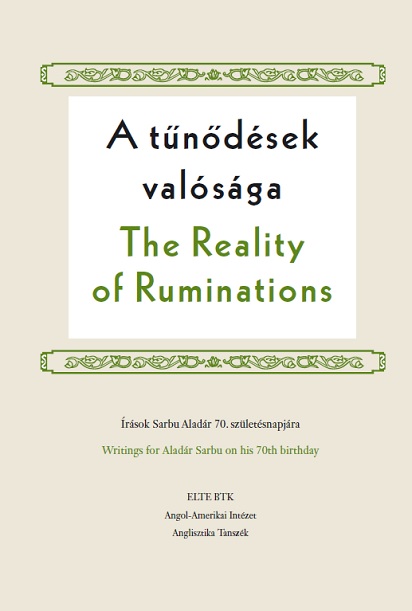 |
Judit Borbély, Zsolt Czigányik (eds.), The Reality of Ruminations. ELTE Papers in English Studies, 2010.
Writings for Aladár Sarbu on his 70th birthday. The book is available on ELTE Reader. |
 |
Tamás Magyarics, Miklós Lojkó (eds.), „Minden gondolatomra számtalan másik árnya hull..." Prime Rate, 2008.
Memory book in honour of Tibor Frank on his 60th birthday. |

